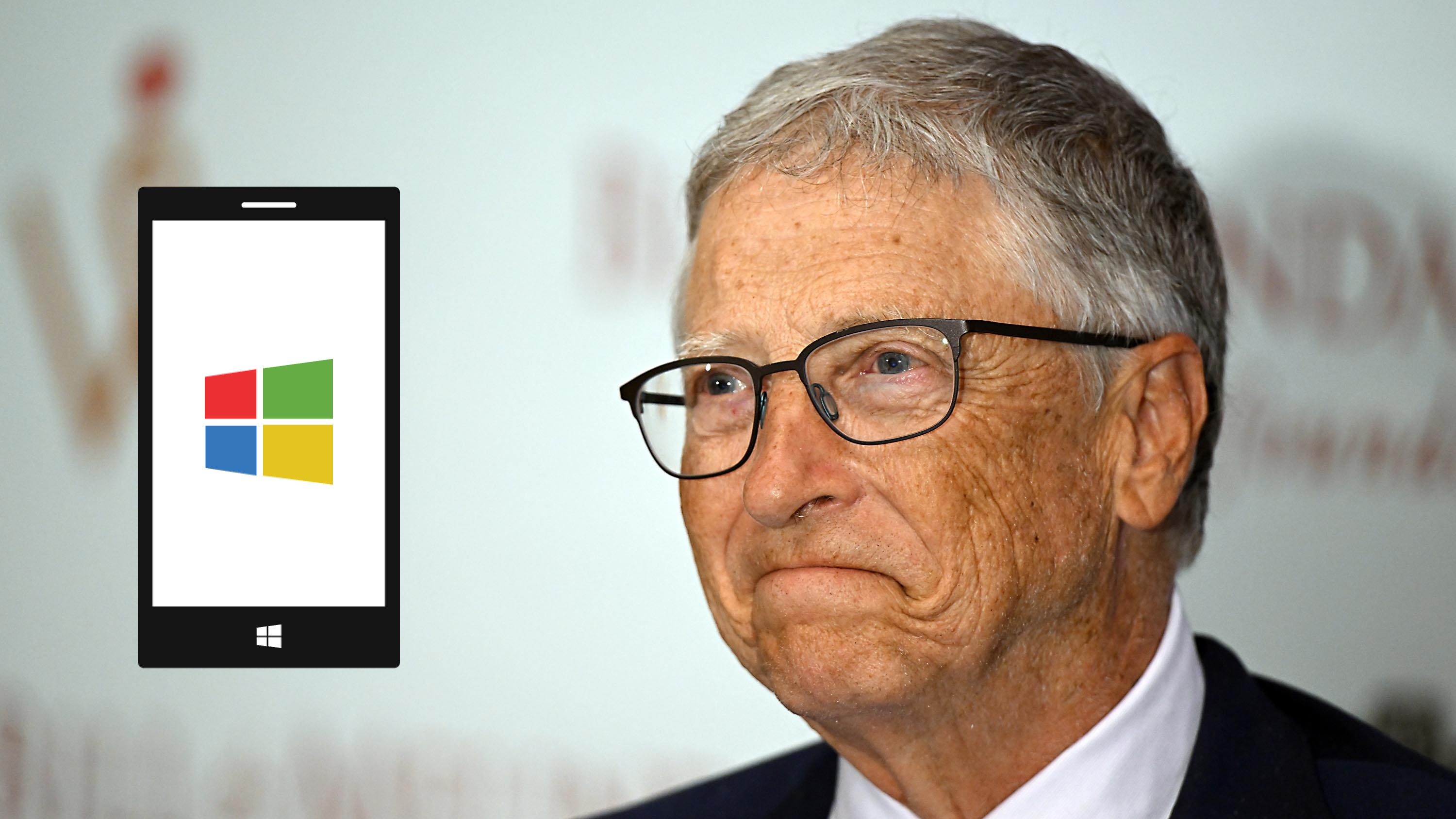"Sorry, Bill": Android co-founder says Bill Gates is responsible for "the greatest mistake of all time," costing Microsoft $400 billion
Android co-founder blames Bill Gates for Microsoft's $400 billion loss and missed opportunity in the mobile landscape.

During an interview with Eventbrite CEO Julia Hartz, Microsoft co-founder Bill Gates revealed his greatest mistake while running the software giant, indicating:
“The greatest mistake of all time is the mismanagement I engaged in that caused Microsoft not to be what Android is.”
As a result, Google ended up developing Android before Microsoft, arguably the most popular operating system, majorly due to its versatility and high level of customization. While the billionaire claims developing a similar operating system would be "a natural thing for Microsoft to win," he admits mismanagement on his part and an array of antitrust-related issues prevented the company from seizing the opportunity,
Following Microsoft's missed opportunity, Google moved to acquire Android in 2005, prompting the launch of its first device in September 2008. On the other hand, Apple had a significant lead over Google in the mobile landscape for over one year and had already launched its first iPhone in 2007.
You know, in the software world, in particular for platforms, these are winner-take-all markets. So, you know, the greatest mistake ever is the whatever mismanagement I engaged in that caused Microsoft not to be what Android is, [meaning] Android is the standard non-Apple phone form platform. It really is a winner-take-all. If you’re there with half as many apps or 90% as many apps, you’re on your way to complete doom. There’s room for exactly one non-Apple operating system, and what’s that worth? $400 billion that would be transferred from company G [Google] to company M [Microsoft].
Microsoft co-founder, Bill Gates
Interestingly, Android co-founder Rich Miner shares a different account on Bill Gates and Microsoft's missed opportunity with Android. According to Miner:
"I literally helped create Android to prevent Microsoft from controlling the phone the way they did the PC - stifling innovation. So it's always funny for me to hear Gates whine about losing mobile to Android."
I literally helped create Android to prevent Microsoft from controlling the phone the way they did the PC - stifling innovation. So it's always funny for me to hear Gates whine about losing mobile to Android 🤣Retweet if you think I should share our original pitch deck1/2 pic.twitter.com/urjZWK0yHEJanuary 14, 2025
Miner further disclosed that he was part of the team that helped Orange launch the first Windows Mobile phone in 2002. Speaking of Windows Phone, Microsoft CEO Satya Nadella admits pulling the plug on It was a "strategic mistake."
Get the Windows Central Newsletter
All the latest news, reviews, and guides for Windows and Xbox diehards.
The Android co-founder further indicated that he was worried Microsoft would end up controlling mobile like PCs. "So, sorry, Bill, you're more responsible for losing the $400B than you realize," Miner concluded.
Microsoft co-founder Bill Gates added that if he had seized the opportunity when it presented itself, Microsoft would be the company.
However, Microsoft is fairing quite well and is among the world's top three most valuable companies, battling for the top spot against Apple and NVIDIA. Last year, Microsoft briefly held the crown ahead of Apple and NVIDIA with over $3 trillion in market valuation, predominantly due to its early investment and adoption of generative AI across its tech stack. Bill Gates says the tech giant continues to enjoy considerable success through its wide array of products, including Windows and Office.

Kevin Okemwa is a seasoned tech journalist based in Nairobi, Kenya with lots of experience covering the latest trends and developments in the industry at Windows Central. With a passion for innovation and a keen eye for detail, he has written for leading publications such as OnMSFT, MakeUseOf, and Windows Report, providing insightful analysis and breaking news on everything revolving around the Microsoft ecosystem. While AFK and not busy following the ever-emerging trends in tech, you can find him exploring the world or listening to music.
-
MullenWP "If you’re there with half as many apps or 90% as many apps, you’re on your way to complete doom."Reply
Exactly. I heard too many comments about how many top apps were on WP, and how "fans" thought all they need are available on WP. The issue is in reality it was barely 90% for top apps (not keep maintained), less than 50% for all apps, and probably less than 10% for games (I understand WP "fans" don't care about mobile games, but if both iOS and Android list games at the top level (same as apps), that means it's extremely important for a successful mobile platform). -
Jcmg62 I remember the excitement with every new hardware launch, the beauty and uniqueness of windows phone 7, the acquisition of Nokia and the development of cortana. There were some phenomenal highlights.Reply
I also remember the unbelievable levels of stupidity, to the point of self sabotage, from windows phone management...
Launching Microsoft apps on iOS and Android, but not WP,
Pushing OS updates that left hardware behind literally a year after launch,
A marked decline in build quality
Windows 10 mobile.... Still a complete WtF moment.
A near constant change in management, with every new leader trying to put a different spin on things and essentially hitting reset every time.
I get the whole app gap issue, and the fact that Microsoft were pushing a rock uphill, but OMG they literally punched themselves in the balls again and again.
It was sad, pathetic, appallingly poor mismanagement, driven by small dick energy within Microsoft that killed Windows phone. -
Ron-F It was poorly managed from beginning to end. Microsoft just didn’t believe Apple would be able to get it right so fast. They were late to the market and their products weren’t competitive. WP7’s interface was fantastic, but the development platform was a dead end. WP8 was not backwards compatible and required new hardware. Finally the start promising Win10 in the phones, but it was already too late.Reply -
JoshRos Microsoft Phone is needed today more than ever. Even if they started again today, they would start from the same point they exited but their store is so much more mature and with Game Pass Cloud it would be the top opportunity especially now that Android is tightening its grasp on users and many will be looking for a way out of this lack of privacy nightmare.Reply
But letting Panos go and now other key members of the hardware design team... tough luck. -
Chris Lovett1 Funny story, I was on a task force to think about the future of mobile back in 2003 at Microsoft, back then we saw the Compaq iPaq device and we saw the flip phone and it was easy to conclude these will merge, we went back to the VP of mobile at the time and said so, and his response was "sorry, Bill is only interested in tablets right now"... Doh! We should have pushed harder...Reply -
Zen Microsoft chose to focus on tablets even harder after they failed in the mobile phone market. I guess Microsoft really regrets not copying the Java language and instead trying to do their own thing. Oh they could have also taken open source software and turned it into a paid product, didn't have to be Java. The judges in the Google vs Java case didn't seem to understand fair use even with Google admitting that they stole code because if they didn't then it wouldn't attract users to their platform.Reply
If taking code and changing variable names is enough to not be copyright infringement, then I guess we all should be taking someone else's work and changing it a little. Its like cheating in school: "Yeah you can copy my homework but change it a little so the teacher thinks its different." -
lpasca People forget the context.Reply
1) Microsoft had a lot of history with anti-trust. Dominating the smartphone market would have been a clear path to a Microsoft split up, and Gates knew that.
2) Microsoft would not have accepted the government "oversight" that Google and Apple almost certainly have. It would have been too much of a risk to their core business, the enterprise market, where customer data privacy also from government is key. Not so for consumers, particularly with perceived "free" services such as unencrypted cloud backup which allows snooping on practically everyone with a smartphone on the planet. -
MPetrozio Apps diversity seemed to be the biggest problem for WP. But here's the thing. The whole idea of apps on early smartphones was because web browsers at that time were not mature enough to handle what apps can do. With modern browsers and PWA's, this is now mostly irrelevant for most apps that don't really need to integrate the devices hardware in meaningful ways, like GPS for example. Microsoft has a shot now to correct its former errors. I'd love to see the return of WP! Copilot Phone anyone?Reply -
Jeffery L Android became the market leader in mobile operating systems by breaking the law. In the early days of Android, it was given away for free to OEMs. That is a violation of predatory pricing in the anti-trust laws. They have corrected that and now charge licensing for Google Mobile Services like Google Play Store, Google Maps, and Gmail, which are essential for a complete Android experience. Android being free in the beginning is what caused the rapid adoption. The core of Android is still free under open source, which I consider that still predatory pricing.Reply -
GraniteStateColin ReplyMullenWP said:"If you’re there with half as many apps or 90% as many apps, you’re on your way to complete doom."
Exactly. I heard too many comments about how many top apps were on WP, and how "fans" thought all they need are available on WP. The issue is in reality it was barely 90% for top apps (not keep maintained), less than 50% for all apps, and probably less than 10% for games (I understand WP "fans" don't care about mobile games, but if both iOS and Android list games at the top level (same as apps), that means it's extremely important for a successful mobile platform).
Ironically, MS had a natural advantage with games thanks to Xbox that they (almost) completely ignored. You could boost Gamerscore via games on Windows Phone, but that was about it.
One of the most essential elements to strategy is leveraging strengths. MS did this right (mostly) with Office, but ignored their unique strength in gaming. Neither Apple nor Google could have offered as good a mobile gaming experience. MS reasoned that smartphone buyers were primarily business users who didn't care about gaming, so not worth "wasting" effort to appeal to gamers who would "never" buy a smartphone.
